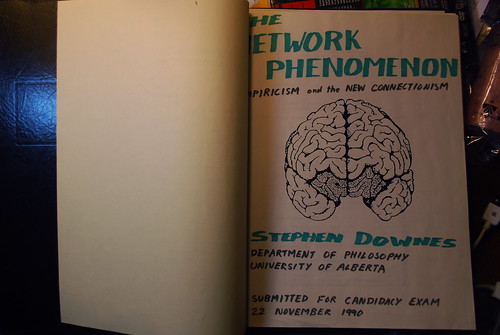Mar 09, 2009
Originally posted on Half an Hour, March 9, 2009.
The Network Phenomenon: Empiricism and the New Connectionism
Stephen Downes, 1990
(The whole document in MS-Word)

1. Introduction
2. Empiricism
3. The Objections to Empiricism
4. Connectionism
5. Distributed Representations
6. The Problems of Perception
7. Associationism: Cognitive Structures
8. Associationism: Inferential Structures
9. Connectionism and Justification
10. Summary
11. Projects and Investigations
TNP: 20 Years On
I. Introduction
I wish to argue in this paper that the new connectionism provides a vindication for classical empiricism. By "empiricism" I mean the philosophy that all knowledge has its origin in experience, that is, that there is no innate or otherwise intuited knowledge. My argument is that connectionism provides a computational framework within which traditional objections to empiricism may be met.
The structure of this paper is as follows. I will begin with a description of what I mean by empiricism. Then I will set out a series of objections to the philosophy I describe. In order to meet those objections, I will first describe connectionism, then outline some objections particular to connectionism, and then finally respond to each of the objections mentioned. Finally, I will discuss some further avenues of investigation.
I would like to caution the reader that this is to a large degree a survey paper. While arguments are sketched in order to demonstrate the plausibility of the thesis being proposed, I do not claim to have completely solved all the problems and to have met all the objections. In addition, the reader will note that many of the arguments given are only sketches and do not consider a number of important yet intricate points. The reason for this is that length was, believe it or not, a limiting factor in this presentation.
TNP Part II Next Post
The Network Phenomenon: Empiricism and the New Connectionism
Stephen Downes, 1990
(The whole document in MS-Word)

1. Introduction
2. Empiricism
3. The Objections to Empiricism
4. Connectionism
5. Distributed Representations
6. The Problems of Perception
7. Associationism: Cognitive Structures
8. Associationism: Inferential Structures
9. Connectionism and Justification
10. Summary
11. Projects and Investigations
TNP: 20 Years On
I. Introduction
I wish to argue in this paper that the new connectionism provides a vindication for classical empiricism. By "empiricism" I mean the philosophy that all knowledge has its origin in experience, that is, that there is no innate or otherwise intuited knowledge. My argument is that connectionism provides a computational framework within which traditional objections to empiricism may be met.
The structure of this paper is as follows. I will begin with a description of what I mean by empiricism. Then I will set out a series of objections to the philosophy I describe. In order to meet those objections, I will first describe connectionism, then outline some objections particular to connectionism, and then finally respond to each of the objections mentioned. Finally, I will discuss some further avenues of investigation.
I would like to caution the reader that this is to a large degree a survey paper. While arguments are sketched in order to demonstrate the plausibility of the thesis being proposed, I do not claim to have completely solved all the problems and to have met all the objections. In addition, the reader will note that many of the arguments given are only sketches and do not consider a number of important yet intricate points. The reason for this is that length was, believe it or not, a limiting factor in this presentation.
TNP Part II Next Post



